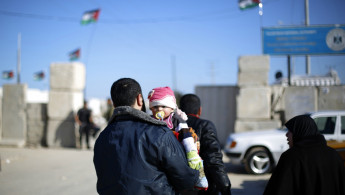Israeli concessions on Gaza a facade, say Palestinians
Israel has reviewed policies on its Gaza crossings, giving out more permits to students and the sick, allowing more building materials in while letting more people out.
But the measures do almost nothing for the people of Gaza - with criticism they are merely a facade after Israel's latest aggression, and as it continues to blockade the impoverished Palestinian territory.
The latest 'Israeli improvements' announced by the Palestinian General Authority for Civil Affairs included doubling the amount of trucks that pass through Kerem Shalom to 800 per day, carrying 4,000 tons of cement.
It has allowed more passengers to cross at Erez, also known as Beit Hanoun. Built in 2007, the crossing is capable of handling 45,000 people a day. However since Hamas took control of the Gaza Strip, only several hundred Palestinians are given access per day.
Israeli authorities also approved access for students to attend universities outside of the region, as well as allowing increasing the number of medical patients allowed to cross from 80 a day to 120.
| There are tens of thousands of individuals who need to travel for humanitarian reasons and are being denied their most basic of rights. Jamal al-Khudari |
But many in Gaza say that the measures do little for those trapped by the Israeli blockade.
Jamal al-Khudari, head of the Popular Committee against the Siege told al-Araby al-Jadeed: "These current Israeli facilities are insufficient - what is required is lifting the siege completely and reopening all of the closed crossings.
"The condition of people in the Gaza Strip is too difficult to describe. There are tens of thousands of people who need to travel for humanitarian reasons and are being denied their most basic of rights."
Khudari also stressed the need to completely lift restrictions on the entry of commodities into Gaza, in particular raw materials needed for factories, and construction equipment needed to rebuild homes destroyed in last year's war.
Separately, the director of the Euro-Mediterranean Observatory for Human Rights, Rami Abdo, told al-Araby that Israel wanted to be seen to be helping the population in Gaza through, but many of its concessions were "cosmetic amenities that most of the people do not notice".
Abdo called on Israel to give Gazans freedom of movement, open all crossings and allow the free entry and transfer of commodities from and to the Gaza Strip.
He said a large numbers would still be turned away from Erez, mainly for "security reasons". Many Gazans do not wish to passing through the Israeli channels because of their risks as they are exposed to arrest, investigation or blackmail by the Israeli intelligence agencies, he added.
Israel has been imposing a siege on Gaza since Hamas took over the strip in after a 2007 election. The siege restricted the freedom of movement of people and goods from and to Gaza Strip, limited the fishing area to six nautical miles, rationed the entry of fuel and construction materials, and prevented the entry of merchandise and raw materials necessary for operating the Gaza factories.



